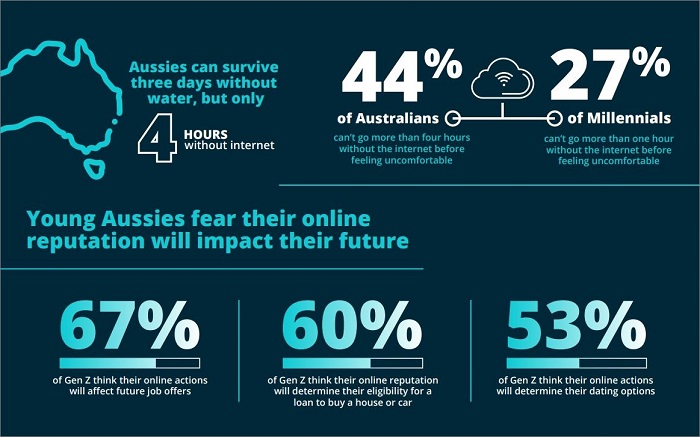Most Australians can’t disconnect from the internet for 24 hours without feeling uncomfortable, a new survey has found.
WP Engine surveyed 1,000 Australians Generation Resilience Report 2021 on their attitudes to the internet and found only 22 per cent of respondents said they could comfortably live without the internet for more than a day.
Broken down into generations, millennials were the most addicted to the internet, with 51 per cent saying they could only last up to four hours without the internet before feeling uncomfortable.
Unsurprisingly, baby boomers were most confident in their abilities to go offline, with the largest proportion of respondents saying they could last two days or more.
Our internet use has naturally ballooned during the COVID-19 pandemic, but that’s not always for the best.
The younger generations – millennials and gen Z – have a particularly complicated relationship with the internet as a majority reported saying they rely on technology more than ever, are more comfortable using it than they were pre-pandemic, but they also want to reduce time spent online.
Gen Z also felt the most aggrieved by a shift to remote work with half of respondents saying they thought the work from home movement stunted their career growth – a sentiment not shared by gen X and the baby boomers.
How long can you go without internet access? Image: supplied
There also remains a strong fear among internet users that their online activity could come back to haunt them.
A majority in each demographic was concerned that what they do online – including social media posts – could affect their job prospects, and ability to get a home loan.
There’s positive signs for the future of local entrepreneurship with half of gen Z and 40 per cent of millennials saying they had plans to start a business.
But there is a shift in where that business interest lies, with the report noting a significant increase in the number of millennials planning to start a technology business – up three times as much this year compared with 2019.
As online activity has gone up, poor cyber security practices continue to put Australians at risk.
LastPass’s latest Psychology of Passwords report found a whopping 71 per cent of Australians use the same password variation – six points higher than the global average 65 per cent.











